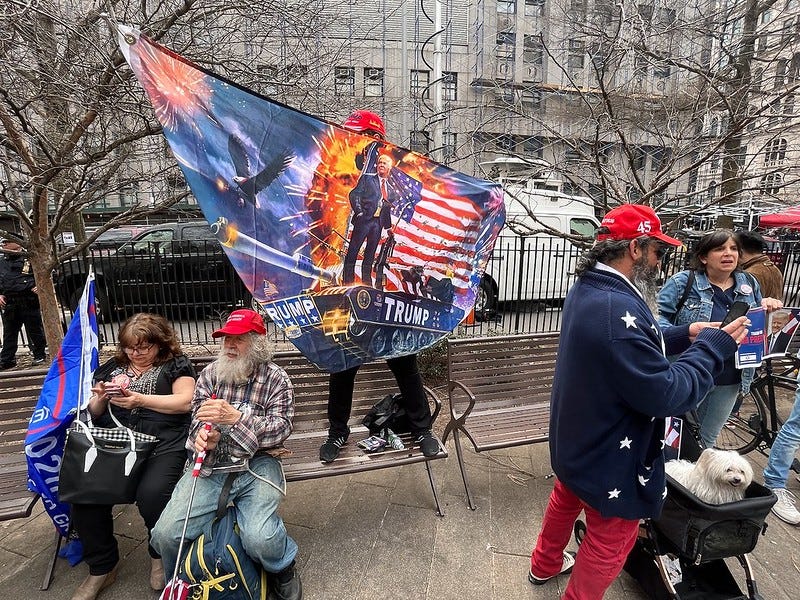It’s been a busy few days.
On Thursday last week, it was reported that Donald Trump would be indicted in Manhattan. Benjamin Wittes and I put together a quick overview of the likely background of the case for Lawfare. For The Atlantic, I considered what it means that we as a country have finally come to this moment.
Finally, yesterday, Trump was arraigned in a Manhattan courtroom yesterday, and the indictment itself was finally unveiled. I wrote an overview of the case with the Lawfare team, which you can read here.
A lot of folks have been arguing that the case against Trump is weak and that Manhattan DA Alvin Bragg is making a mistake in charging it. That, I don’t know; Bragg hasn’t shown much of his hand, and until we have more of a sense of what he has in store, it will be hard to know what to make of the prosecution. I do, though, think it’s a mistake to write off the underlying facts of the case—a series of hush-money payments that Trump coordinated to two women in order to prevent them from going public about their affairs with him in advance of the 2016 election—as small potatoes. As with the Russia investigation, the Ukraine impeachment, and Trump’s efforts to overthrow the 2020 election, the hush-money story is about an unprincipled man who will do anything to obtain and keep power. That’s an ugly portrait of a person who is, once again, running for president of the United States.
As I wrote for The Atlantic this morning:
Trump did not just purchase silence ahead of the 2016 vote. He worked while he was in office to complete the cover-up. When The Wall Street Journal first began reporting about the payments to [adult film star Stormy] Daniels and McDougal in 2018, Trump lied repeatedly to the American public and claimed that he had no knowledge of the matter. Before that, as Bragg sets out and as [Trump’s lawyer Michael] Cohen admitted in his plea deal with the Southern District of New York, Trump repaid Cohen with a series of checks in 2017, after Trump had sworn the oath of office. According to Bragg, the two finalized the arrangements for repayment in a February 2017 meeting held in the Oval Office itself.
This is, by now, a familiar portrait: a candidate, and then a president, obsessed with gaining and holding on to power at all costs, without any care for or comprehension of his obligations to the public, nor any commitment to play by the rules that bind everyone else. Such conduct speaks directly to Trumpanything outside of himself. I would not, personally, rank it as worse than seeking to overturn the results of a lawful election or attempting a coup. But it is disturbing all the same.
In 2019, after Cohen’s plea and subsequent testimony to Congress about his role in the hush-money scheme, the New York Times published an overview of Trump’s presidential schedule on the precise days that he cut reimbursement checks to Cohen for the payments to Daniels. You can see exactly what Trump was doing on the days he signed those checks: meeting with foreign dignitaries, hosting gatherings in the Oval Office, carrying out the work of the presidency.
I wrote with Bob Bauer in 2018 that Trump’s involvement in the hush money payments arguably constituted an impeachable offense—perhaps not one that urgently demanded impeachment, but conduct that breached Trump’s oath of office all the same. I think that holds up.
Until recently, the hush-money matter had somewhat receded into the undifferentiated stew of Trump scandals that made up his presidency. I don’t know if the case merits prosecution. But it’s more than just a sideshow.




